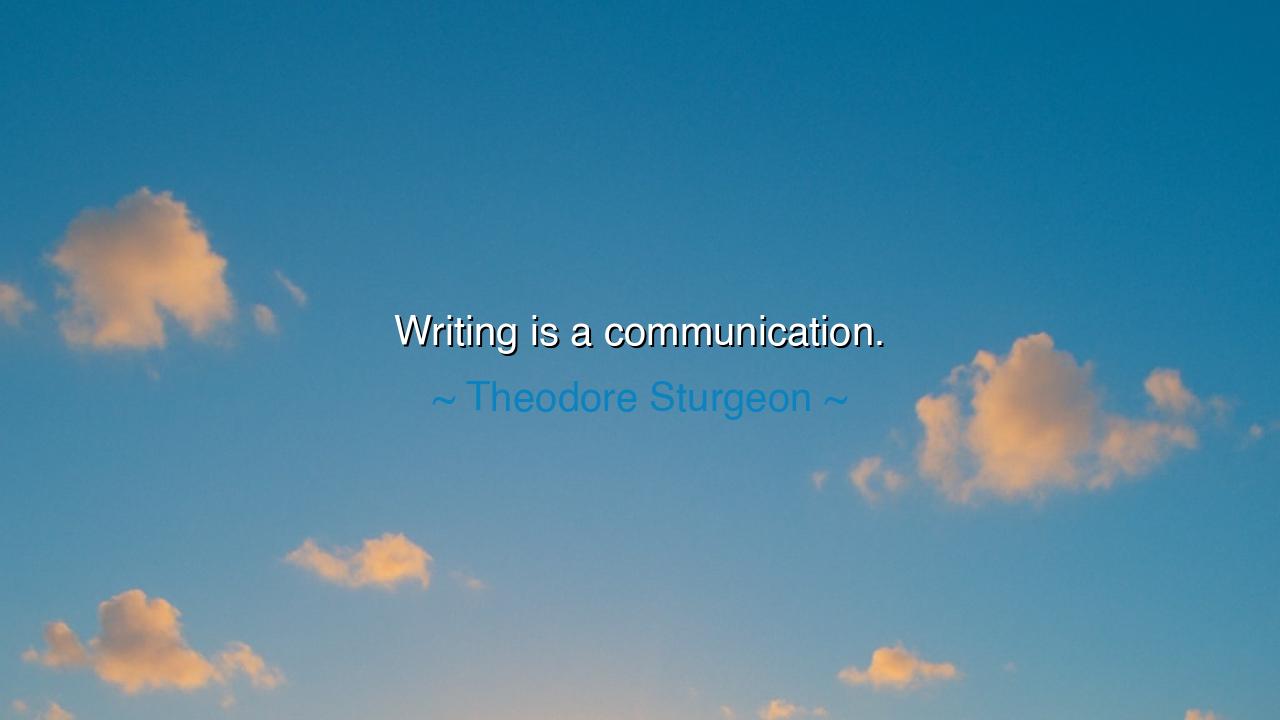
Writing is a communication.






Host: The rain fell softly outside the small apartment window, tracing thin rivers down the glass. The faint hum of the city beyond—distant traffic, a passing siren, a muffled argument in the street—seemed to dissolve against the rhythm of typing. Inside, the room was dim but alive with warmth: papers scattered, a lamp glowing amber, and the faint scent of coffee and ink mingling in the air.
Host: Jack sat at a desk by the window, his hands hovering over a typewriter that looked as worn as his eyes—grey, focused, and full of the fatigue that comes from loving what you do too much. Across from him, curled in an old armchair, was Jeeny, a notebook open on her knees, a pen dangling loosely between her fingers. Between them, on the cluttered table, a single scrap of paper bore Theodore Sturgeon’s words, short but undeniable:
“Writing is a communication.”
— Theodore Sturgeon
Host: The phrase seemed almost too simple for the weight it carried—like a whisper disguised as revelation.
Jack: smirking faintly “You’d think it was obvious, wouldn’t you? ‘Writing is a communication.’ But somehow, it’s the thing most writers forget.”
Jeeny: looking up, amused “Forget, or avoid?”
Jack: “Both,” he said. “We write to impress, to confess, to escape. But communication? That requires honesty. And honesty—well, that’s the hardest kind of art.”
Jeeny: “Maybe because communication means connection,” she said softly. “And connection means vulnerability. You can hide behind cleverness or style, but the moment you communicate, you’re exposed.”
Jack: nodding slowly “That’s it. You stop performing and start speaking. You risk not being admired but being understood—and that’s far more dangerous.”
Host: The lamp flickered, as if agreeing. The typewriter keys clicked once, twice, then fell still.
Jeeny: “Sturgeon wasn’t just reminding us what writing is,” she said. “He was reminding us what it’s for. To bridge. To reach. To tell another mind, ‘I was here, and this is what it felt like.’”
Jack: “And yet,” he said, “so many writers treat it like a mirror instead of a bridge. They write to see themselves reflected—not to reach the other shore.”
Jeeny: “Maybe that’s because they’re afraid the other shore won’t answer.”
Jack: half-smiling “You think he meant communication as a two-way thing? Like dialogue?”
Jeeny: “Of course,” she said. “Even when the reader’s silent. Writing is the beginning of a conversation that continues in someone else’s head. Every word you write is a question: ‘Do you feel this too?’”
Host: The sound of rain softened, becoming a delicate percussion on the sill. The room seemed suspended in time—half thought, half confession.
Jack: “You ever wonder if all writers are just trying to cheat loneliness?”
Jeeny: “All humans are,” she said. “Writers just do it with punctuation.”
Jack: chuckling “So writing’s not just communication—it’s communion.”
Jeeny: “Yes,” she said. “The sacred kind. The kind that happens when two people meet in the space between silence and syntax.”
Host: The camera lingered on Jeeny’s face as she spoke, the lamplight catching the edge of her smile, her words almost visible in the air.
Jack: “But communication can fail too,” he said quietly. “A word misplaced, a tone misunderstood—and suddenly the bridge collapses. Writing can wound as easily as it heals.”
Jeeny: “That’s true,” she said. “But even failure to communicate is communication. Silence speaks. Misunderstanding still connects—it shows that someone tried to reach.”
Jack: “You sound forgiving.”
Jeeny: “Because art is forgiveness,” she said. “Every story is a failed attempt at perfect truth, and yet we keep writing. That’s what makes it beautiful—the persistence of trying to speak the unspeakable.”
Host: A gust of wind rattled the windowpane, scattering a few loose pages across the floor. Jack bent down to gather them, his fingers trembling slightly.
Jack: “You know,” he said, “I’ve spent years thinking writing was about expression—about me. But Sturgeon’s right. Expression without communication is just noise.”
Jeeny: “And communication without feeling is propaganda,” she said softly.
Jack: smiling faintly “So the balance is the trick.”
Jeeny: “Always,” she said. “You can’t communicate what you don’t feel, and you can’t truly feel unless you risk being understood.”
Host: Outside, the rain slowed to a mist. The city’s hum returned—a distant murmur of stories unfolding everywhere, countless people trying, in their own ways, to say something.
Jack: “You think that’s why people write?” he asked. “To be remembered?”
Jeeny: “No,” she said. “To be heard. Memory fades, but communication changes people. A single sentence can outlive monuments because it transfers not fact, but feeling.”
Jack: “Then maybe writers aren’t architects,” he said. “They’re messengers.”
Jeeny: “Exactly,” she said. “And every message is a kind of rescue. A hand reaching through time, saying, ‘You’re not alone.’”
Host: The camera drifted slowly toward the desk — the typewriter waiting, the page half-filled, the ink still wet. The quote from Theodore Sturgeon rested beside it, lit softly by the glow of the lamp, the words both humble and infinite:
“Writing is a communication.”
Host: Jack sat down again, his fingers hovering over the keys. He looked at Jeeny once, then at the blank line waiting for its next word.
Host: And as the first keystroke broke the silence, the sound was almost holy — not the sound of creation, but of connection being born.
Host: Because to write is to reach, and to reach is to risk. And in that risk, humanity breathes — one sentence at a time.






AAdministratorAdministrator
Welcome, honored guests. Please leave a comment, we will respond soon